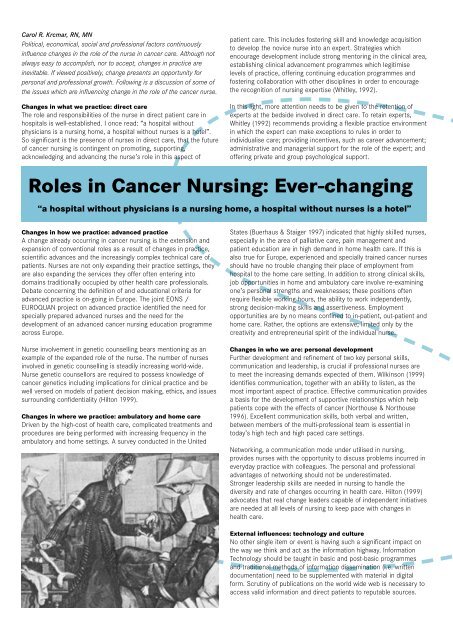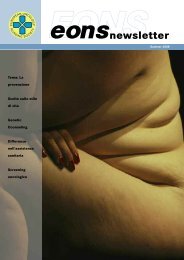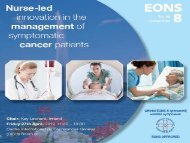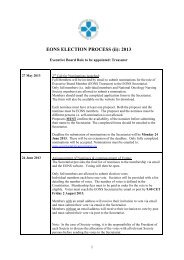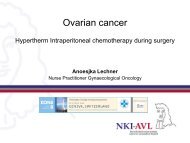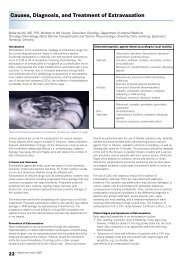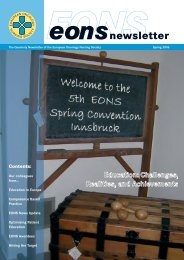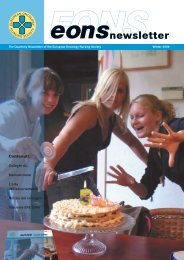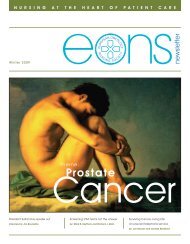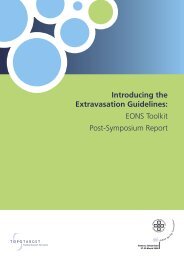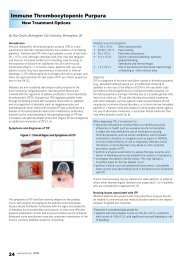ECCO XII Copenhagen - the European Oncology Nursing Society
ECCO XII Copenhagen - the European Oncology Nursing Society
ECCO XII Copenhagen - the European Oncology Nursing Society
You also want an ePaper? Increase the reach of your titles
YUMPU automatically turns print PDFs into web optimized ePapers that Google loves.
Carol R. Krcmar, RN, MNPolitical, economical, social and professional factors continuouslyinfluence changes in <strong>the</strong> role of <strong>the</strong> nurse in cancer care. Although notalways easy to accomplish, nor to accept, changes in practice areinevitable. If viewed positively, change presents an opportunity forpersonal and professional growth. Following is a discussion of some of<strong>the</strong> issues which are influencing change in <strong>the</strong> role of <strong>the</strong> cancer nurse.Changes in what we practice: direct careThe role and responsibilities of <strong>the</strong> nurse in direct patient care inhospitals is well-established. I once read: “a hospital withoutphysicians is a nursing home, a hospital without nurses is a hotel”.So significant is <strong>the</strong> presence of nurses in direct care, that <strong>the</strong> futureof cancer nursing is contingent on promoting, supporting,acknowledging and advancing <strong>the</strong> nurse’s role in this aspect ofpatient care. This includes fostering skill and knowledge acquisitionto develop <strong>the</strong> novice nurse into an expert. Strategies whichencourage development include strong mentoring in <strong>the</strong> clinical area,establishing clinical advancement programmes which legitimiselevels of practice, offering continuing education programmes andfostering collaboration with o<strong>the</strong>r disciplines in order to encourage<strong>the</strong> recognition of nursing expertise (Whitley, 1992).In this light, more attention needs to be given to <strong>the</strong> retention ofexperts at <strong>the</strong> bedside involved in direct care. To retain experts,Whitley (1992) recommends providing a flexible practice environmentin which <strong>the</strong> expert can make exceptions to rules in order toindividualise care; providing incentives, such as career advancement;administrative and managerial support for <strong>the</strong> role of <strong>the</strong> expert; andoffering private and group psychological support.Roles in Cancer <strong>Nursing</strong>: Ever-changing“a hospital without physicians is a nursing home, a hospital without nurses is a hotel”Changes in how we practice: advanced practiceA change already occurring in cancer nursing is <strong>the</strong> extension andexpansion of conventional roles as a result of changes in practice,scientific advances and <strong>the</strong> increasingly complex technical care ofpatients. Nurses are not only expanding <strong>the</strong>ir practice settings, <strong>the</strong>yare also expanding <strong>the</strong> services <strong>the</strong>y offer often entering intodomains traditionally occupied by o<strong>the</strong>r health care professionals.Debate concerning <strong>the</strong> definition of and educational criteria foradvanced practice is on-going in Europe. The joint EONS /EUROQUAN project on advanced practice identified <strong>the</strong> need forspecially prepared advanced nurses and <strong>the</strong> need for <strong>the</strong>development of an advanced cancer nursing education programmeacross Europe.Nurse involvement in genetic counselling bears mentioning as anexample of <strong>the</strong> expanded role of <strong>the</strong> nurse. The number of nursesinvolved in genetic counselling is steadily increasing world-wide.Nurse genetic counsellors are required to possess knowledge ofcancer genetics including implications for clinical practice and bewell versed on models of patient decision making, ethics, and issuessurrounding confidentiality (Hilton 1999).Changes in where we practice: ambulatory and home careDriven by <strong>the</strong> high-cost of health care, complicated treatments andprocedures are being performed with increasing frequency in <strong>the</strong>ambulatory and home settings. A survey conducted in <strong>the</strong> UnitedStates (Buerhaus & Staiger 1997) indicated that highly skilled nurses,especially in <strong>the</strong> area of palliative care, pain management andpatient education are in high demand in home health care. If this isalso true for Europe, experienced and specially trained cancer nursesshould have no trouble changing <strong>the</strong>ir place of employment fromhospital to <strong>the</strong> home care setting. In addition to strong clinical skills,job opportunities in home and ambulatory care involve re-examiningone’s personal strengths and weaknesses; <strong>the</strong>se positions oftenrequire flexible working hours, <strong>the</strong> ability to work independently,strong decision-making skills and assertiveness. Employmentopportunities are by no means confined to in-patient, out-patient andhome care. Ra<strong>the</strong>r, <strong>the</strong> options are extensive; limited only by <strong>the</strong>creativity and entrepreneurial spirit of <strong>the</strong> individual nurse.Changes in who we are: personal developmentFur<strong>the</strong>r development and refinement of two key personal skills,communication and leadership, is crucial if professional nurses areto meet <strong>the</strong> increasing demands expected of <strong>the</strong>m. Wilkinson (1999)identifies communication, toge<strong>the</strong>r with an ability to listen, as <strong>the</strong>most important aspect of practice. Effective communication providesa basis for <strong>the</strong> development of supportive relationships which helppatients cope with <strong>the</strong> effects of cancer (Northouse & Northouse1996). Excellent communication skills, both verbal and written,between members of <strong>the</strong> multi-professional team is essential intoday’s high tech and high paced care settings.Networking, a communication mode under utilised in nursing,provides nurses with <strong>the</strong> opportunity to discuss problems incurred ineveryday practice with colleagues. The personal and professionaladvantages of networking should not be underestimated.Stronger leadership skills are needed in nursing to handle <strong>the</strong>diversity and rate of changes occurring in health care. Hilton (1999)advocates that real change leaders capable of independent initiativesare needed at all levels of nursing to keep pace with changes inhealth care.External influences: technology and cultureNo o<strong>the</strong>r single item or event is having such a significant impact on<strong>the</strong> way we think and act as <strong>the</strong> information highway. InformationTechnology should be taught in basic and post-basic programmesand traditional methods of information dissemination (i.e. writtendocumentation) need to be supplemented with material in digitalform. Scrutiny of publications on <strong>the</strong> world wide web is necessary toaccess valid information and direct patients to reputable sources.


